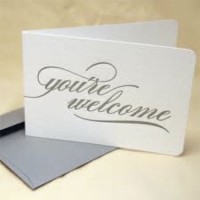
Learning To Say “You’re Welcomeâ€


As the years pass, it seems that American’s language, dress and actions have become more and more casual. This is not always to the benefit of our children. In order for them to grow up to understand that correct social graces can have a beneficial effect on how they are viewed, they must be taught. Here’s something you can help them with: learning to say “you’re welcome.â€
What do you say when someone says “thank you?†If you say anything other than “you’re welcome,†then you are practicing lazy language usage. Why can’t “No problem,†“No Biggie,†or, even worse, the texting inspired “NP†be acceptable? Because no matter how you say it, it’s not professional and it gives the wrong impression of you to the person with whom you are speaking. Let’s say you go to open a savings account at your bank and have to spend time doing hours of paper work and making many decisions, you thank your banker and get the response of “No problem.†Well, it may not have been a problem for them, but it sure was a hassle for you. “No problem,†can also subtly imply that if the task was a problem there’s a chance that the person would not provide help. By responding “You’re welcome†when someone thanks you, you show that you have pride in what you say and do and that you appreciate the thanks. Remember that every relationship, no matter what, is reciprocal.
“You’re welcome,†may seem somewhat traditional to some of you, but most people will appreciate the sincerity of your response. Grandma is fond of telling young people in our family that “No Problem,†is a poor man’s response, but no matter how poor or rich you may be, “You’re Welcome†will stick with people as genuine and therefore, so will you.

